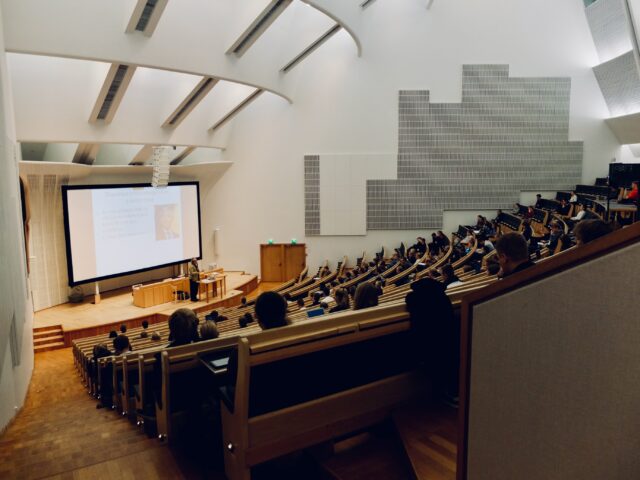The Government of Ontario has received the blue-ribbon panel’s report on how to support the financial sustainability of the province’s postsecondary system. The report’s recommendations include implementing an integrated funding framework, enhancing cost efficiency, and taking steps to reduce risk and monitor international enrolment. The Council of Ontario Universities (COU) called on the province to “immediately implement” the recommendations, particularly the recommendation to implement a three-year tuition fee framework starting with a 5% tuition increase and the recommendation to immediately boost operating grants. ON Minister of Colleges and Universities Jill Dunlop stated that the province is reviewing the panel’s recommendations and indicated that “we need to ensure that colleges and universities […] are operating as efficiently as possible” before ON would agree to tuition increases.

Top Ten News
November 17, 2023
Simon Fraser University and Aga Khan University have signed a new Memorandum of Understanding that builds on their longstanding relationship and work in East Africa. At the MOU signing, SFU and AKU unveiled a new research centre that will support climate innovation research partnerships, student exchanges, and other collaborations. SFU also entered into a strategic alliance with the Nelson Mandela African Institute of Science and Technology, which formalized a partnership with AKU during the signing ceremony. “I truly believe that international collaborations are a critical avenue for creating the inclusive and sustainable future we all want to see,” said SFU President Joy Johnson.
Dalhousie University has launched a new application portal that offers a more intuitive interface, better communications, and reduced service times. It’s truly a one-stop shop’ for students to track their admission process and stay informed about all the events and supports available to them, said Dal Interim Associate Registrar Ann MacDonald. Applicants will be able to see details about their application, such as status updates, while the university will be able to offer more targeted, personalized outreach and make more strategic decisions. The system’s improvements are intended to help reduce incidents where prospective students abandon their applications before submission and increase university enrolment.
Université Laval has partnered with BMO to launch the BMO Young Indigenous Leaders Program. The program will improve access to scholarships, partnerships and community projects, mentorships, and more in order to support the academic and professional journey of Indigenous forestry students. The program is led by the ULaval Chair of Educational Leadership in Indigenous Forestry Jean-Michel Beaudoin and supported by a $500K donation from BMO. “BMO and Université Laval share a desire to showcase the voices, legitimacy and skills of young First Nations leaders,” said ULaval Rector Sophie D’Amours. “This distinctive experiential program will strengthen the development of their forestry skills and entrepreneurial spirit.”
York University’s YSpace has partnered with BDC’s Thrive Lab to support early-stage women-led social impact businesses. In the first phase of the project, Thrive Lab and partners such as YSpace will co-invest in businesses that are at their earliest stage of development. YSpace will help to identify women-led ventures that would be candidates for funding and support. BDC will be providing an overall sum of $35M for the initiative’s first phase, $250K of which will go toward accelerating companies selected by YSpace.
Concordia University has reportedly banned two people from campus after a recent on-campus altercation. Concordia President Graham Carr said that the individuals are not Concordia community members and that there are ongoing investigations into other possible violations of Concordia’s Code of Rights and Responsibilities. Carr called for calm on campus and requested that campus community members be responsible and respectful of each other. We are less than three weeks from the end of fall classes, wrote Carr in a letter to students. I strongly believe we need a cooling off period to allow us all to focus on academic success. Carr will reportedly be meeting with student groups and union leaders to discuss how tensions on campus could be eased and will meet with experts on mediation and conflict resolution to discuss next steps.
The University of Fredericton has partnered with the Forum for International Trade Training (FITT) to give students in UFred’s Bachelor of Business Administration International Business stream the opportunity to attain FITT credentials. FITTskills courses will be integrated into the BBA program and students who complete at least three FITT-designated courses will be eligible to pursue a FITT credential and work toward FITT’s professional Certified International Trade Professional (CITP) designation. Through the integration of FITTskills courses within our [BBA] program, we are not only elevating the academic experience but also emboldening our students with the global business acumen essential in today’s borderless business landscape, said UFred Dean of Academics Michael Hobeck.
Seneca Polytechnic and St Lawrence College recently received software and technology donations from industry partners that will support student learning. At Seneca, students will use donated VR headsets and Technomatix software licenses from Siemens to experience the Industry 4.0 environment and practice their advanced technology skills on a program that companies around the world use. At SLC, a gift of software from transportation management system software developer Rose Rocket will enable Supply Chain Management faculty and students to run advanced logistics simulations. The college is renaming a computer lab the Rose Rocket Lab in honour of the gift.
Thompson Rivers University’s board of governors is expected to decide on the future of its visual arts programming in an upcoming meeting. Business in Vancouver and Castanet have published summaries of the developments since the university first announced in April that it intended to phase out the BFA program, including shifts in the institution’s decision-making and the faculty association’s open push back of the program cancellation. BIV reports that the university senate is expected to provide advice to the board of governors about the proposed elimination of “four named programs.”
For decades, the interview process for tenure-track positions was relatively fixed in both timing and format, write Jennifer S Furlong (City University of New York) and Stacy M Hartman (CUNY). For today’s faculty job candidates, however, that system has been disrupted. Furlong and Hartman discuss how the hiring process for tenure-track positions has changed over recent years and offer guidance on what to expect in today’s market. They touch on what to expect and how to prepare for each round of interviews. They conclude by answering common questions interviewees may have, such as when to ask about compensation, how long to expect to wait for a decision, and whether to send thank-you notes to the committee.
